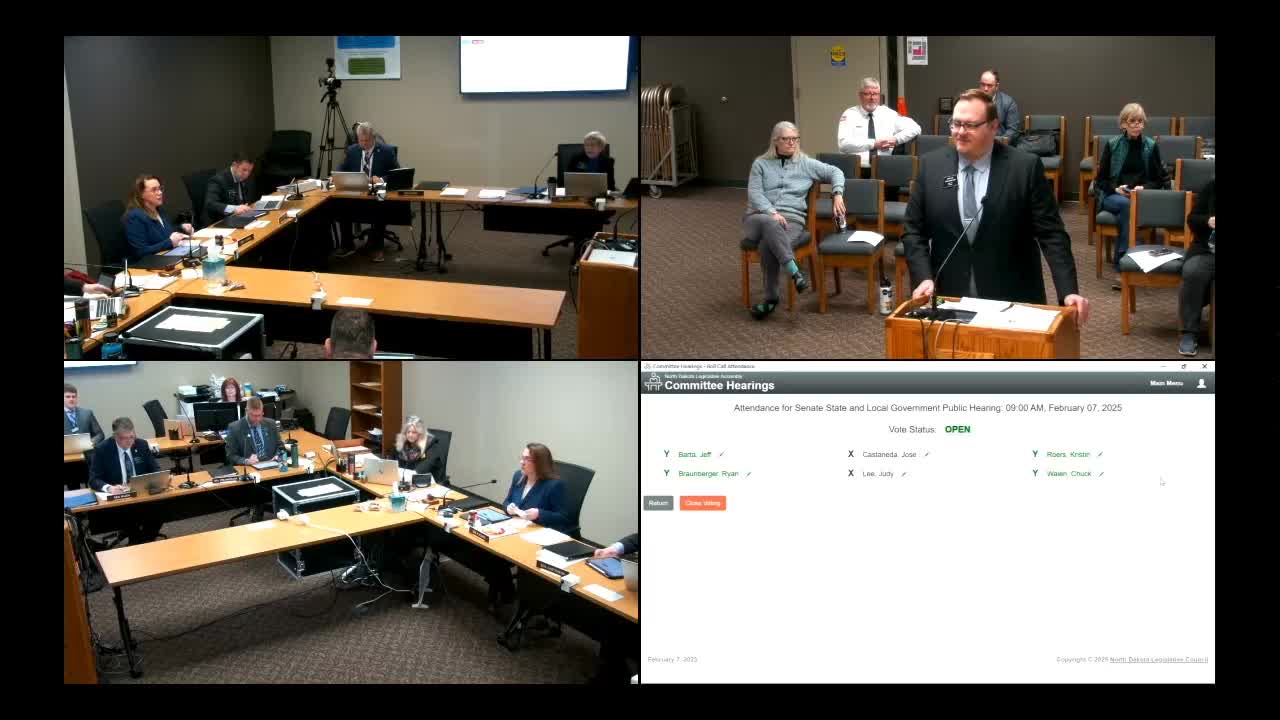Senate committee hears months of testimony on bill to create Theodore Roosevelt National Park wild-horse working group
Get AI-powered insights, summaries, and transcripts
Subscribe
Summary
The Senate State and Local Government Committee on Thursday heard more than two hours of testimony on Senate Bill 2331, a proposal to create a North Dakota working group to consult with Theodore Roosevelt National Park on management of its wild‑horse herd.
The Senate State and Local Government Committee on Thursday heard more than two hours of testimony on Senate Bill 2331, a proposal to create a North Dakota working group to consult with Theodore Roosevelt National Park on management of its wild-horse herd.
Sponsor State Senator Josh Bauscher, the bill’s primary sponsor, told the committee that “Senate Bill 23 31 is the result of work of many people throughout the state,” and said the group is intended to give the state a formal entity to consult with the park and federal representatives before certain actions regarding the herd. Bauscher said the measure is intended to preserve the horses “for generations to come.”
Proponents — including Chasing Horses Wild Horse Advocates and representatives of Colorado’s Wild Horse Working Group — described long-term state involvement and urged the committee to advance the bill. Christine Kammann, co-founder and president of Chasing Horses Wild Horse Advocates, said the park has previously offered to transfer the animals to state control and that the park has a “clear history of trying to eliminate the wild horses,” testimony that proponents used to argue for state oversight and a companion federal resolution (SCR 4006) seeking federal protections.
Colorado lobbyist Sandra Hagen Solon, appearing virtually as a participant in the Colorado working group, described a Colorado model that includes on‑range fertility-control funding and off‑range adoption and care programs. Solon said Colorado’s approach included $1.5 million in state funding, with a portion used for fertility control and professionalizing volunteer efforts. Eric Mulvar, a wildlife biologist, urged the committee to include a “strong science component,” warning against long‑term sterility programs that could reduce genetic viability; he said published work suggests an effective breeding population target of roughly 100 breeders and estimated Theodore Roosevelt National Park’s herd size in the low 200s.
Committee members pressed sponsors on federal–state coordination and whether Department of the Interior or members of the congressional delegation support the bill. Bauscher said the working group would be advisory: “the language is about consultation,” and would not give the state authority to direct park operations but would create a formal entity for the park to consult. He and several witnesses said timing was important because former Governor Doug Burgum has been confirmed as U.S. secretary of the interior and Senator John Hoeven has shown interest in federal action that could give the working group more formal status.
Senators also debated the bill’s draft language and funding. Bauscher proposed two committee amendments: one to allow lethal or emergency actions where “the health or safety of a horse is compromised,” and a second to correct an appropriation figure (striking $50,000 and replacing it with $49,500 to reflect a drafting error). The committee adopted the amendment language unanimously before taking the committee’s final recommendation.
After debate over whether the state should move now or await progress on a federal resolution and the new Interior secretary’s role, the committee voted to recommend a do‑not‑pass on SB 2331 as amended. The roll call on that procedural recommendation recorded four senators voting to register a do‑not‑pass recommendation and two opposing; the committee assigned Senator Barta as the carrier if the bill proceeds further.
Supporters said the working group would provide the park with additional perspectives, resources and local knowledge; critics and some committee members urged more emphasis on scientific analysis and asked whether a state advisory body would change outcomes on federal land.
The committee also heard specific operational proposals during testimony: Colorado’s statute-designated working group funds fertility-control programs, supports trained volunteers and leverages USDA partnerships; witnesses recommended including veterinarians, state agency staff, tribal representatives and subject‑matter experts on genetics and population dynamics.
The bill’s hearing closed after testimony from advocates, scientists and local residents; no final floor action by the full Senate was recorded during the committee session.
Theodore Roosevelt National Park, the Bureau of Land Management and the National Park Service were cited repeatedly in testimony; the committee and witnesses noted that any binding changes on park management would require federal action or cooperation.
The committee’s do‑not‑pass recommendation does not prevent the sponsor from bringing the bill to the floor or seeking other legislative vehicles; supporters pointed to an accompanying Senate concurrent resolution urging federal protection as the parallel path to secure the horses’ status.
Questions remain about the bill’s effect on park authority and whether a state advisory group will change federal management decisions. Proponents emphasized oversight, tourism value and cultural ties; scientists urged monitoring for inbreeding and careful selection of fertility‑control methods.
The committee tabled further action on the bill after the vote and signaled additional work on language and board composition could continue in subsequent sessions or appropriations discussions.
